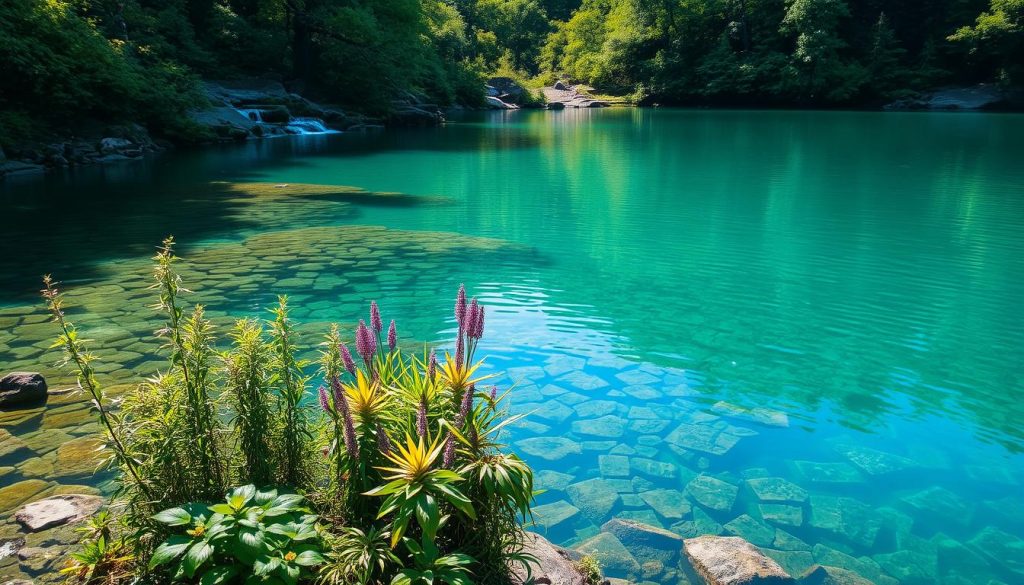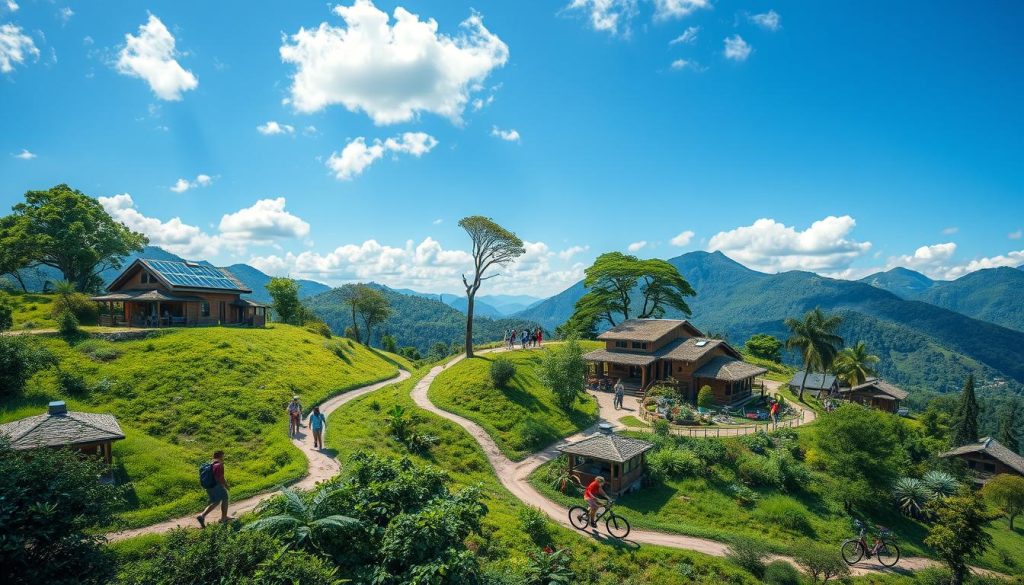Now, more people are focusing on eco-friendly travel. We all want to be kinder to the planet. So, we ask ourselves: How can we make our trips greener? What steps can we take to reduce our carbon footprint while exploring the world? How do we connect with the places we visit in a good way?
There are many ways to lessen our impact on the environment while traveling. For example, we can stay closer to home, pick greener ways to get around, and cut down on plastic use1.
Key Takeaways
- Sustainable tourism is a growing trend that focuses on reducing the environmental impact of travel.
- Eco-conscious travelers can make choices to lower their carbon footprint, such as choosing eco-friendly transportation and accommodations.
- Responsible travel involves being mindful of the local communities and ecosystems visited, and seeking to have a positive impact.
- Low-impact travel techniques, like staying longer in one location, can help minimize fuel consumption and emissions.
- Environmental conservation and ethical tourism practices are important considerations for the modern traveler.
The Rise of Sustainable Travel
The tourism industry is changing fast, thanks to a growing awareness of the need for sustainable tourism. Over the last three to four decades, better transportation has made more people travel. This has led to a big increase in tourism, says Dr. Joseph Scarcelli, an expert in hospitality and tourism management2. But this growth has often harmed the environment and local communities. This has made people rethink how tourism should be done2.
What is Sustainable Tourism?
Sustainable tourism, or eco-friendly tourism, is all about reducing harm to the environment, respecting local cultures, and helping communities2. It aims to make money for local areas, keep cultural traditions alive, and protect nature. This approach is known as the “triple multiplier effect.”2
The Need for Responsible Travel
More people now want sustainable travel because they care about the environment and want eco-friendly choices3. Flying alone creates about 2% of all carbon dioxide emissions3. Traditional tourism has also led to a lot of waste and pollution, putting a strain on places that tourists visit3.
So, there’s a big push for sustainable travel experiences that focus on saving nature, working with communities, and being true to local culture3. Governments, technology, and social media are helping make this happen3. Travelers are now encouraged to respect local people, act responsibly, and pick places to stay that care about the planet2.
“90% of respondents look for sustainable options when traveling.”4
The tourism world is changing, and we need responsible travel more than ever. By choosing sustainable tourism, we can help protect our planet and support the communities we visit. This way, we get to enjoy regenerative travel that’s good for everyone2.
travel tips for ecofriendly travelers
As the world pays more attention to travel’s environmental impact, eco-friendly travelers look for ways to explore without harming the planet. They aim to reduce their carbon footprint by choosing sustainable options and supporting local communities. This approach helps make travel more responsible and sustainable.
One key tip is to get off the beaten path. This means avoiding places that are too crowded and well-known. By doing so, you help ease the strain on local resources and ecosystems5.
Another way to be eco-friendly is to slow down and stay longer in destinations. This lets you dive deeper into local culture, support small businesses, and cut down on carbon emissions from constant travel6.
Choosing the right way to travel is also important. Opting for trains, buses, or electric vehicles can greatly reduce your carbon footprint. Since air travel is a big source of greenhouse gases, try to avoid flights and use ground transport instead7.
Being mindful of how you use resources is another key part of eco-friendly travel. This means turning off lights and electronics when not needed, taking shorter showers, and reusing towels and linens7.
Lastly, supporting local communities is vital. By choosing to stay in places owned by locals, eating at family-run restaurants, and buying from small businesses, you help the local economy and keep cultural traditions alive6.
By following these tips, you can travel the world while keeping your environmental impact low. This way, you contribute to the sustainability of the places you visit.
Get Off the Beaten Path
Exploring less-visited places helps avoid the crowds and offers real travel experiences8. More people now want unique and exciting content beyond the usual tourist spots8. Traveling during the off-season can also save money and ease the strain on popular spots9.
Looking for hidden gems requires some research8. Talking to locals and joining travel groups on social media can give you great tips8. Choosing to stay at places like hostels and eco-lodges supports sustainability and gives you a true taste of the area98.
Diving into the local culture is crucial when you’re off the usual tourist path8. Joining in festivals, eating traditional food, and shopping local can make your trip more meaningful8. Activities like hiking, wildlife watching, and visiting historical sites offer unforgettable experiences8.
By venturing off the beaten path, you can dodge the crowds and find hidden spots for a genuine and eco-friendly trip8. Whether it’s wandering through a small town, trekking on a secluded trail, or meeting locals, the benefits of exploring beyond the tourist hotspots are immense8.
Slow Down and Stay Awhile
The Benefits of Slow Travel
Today, we’re often pushed to make the most of every travel moment. “Slow travel” offers a fresh take on this. It means taking your time, diving into local life, and building strong bonds with the places you visit1011.
By slowing down and sticking around, you really get to know a place. You won’t just zip from spot to spot. This way, you lessen your environmental impact10 and make your trip more memorable. Slow travel helps you be more mindful and appreciate the beauty around you11.
Slow travel lets you connect deeply with local communities. You become part of the town, learn its ways, taste its food, and join in daily life. This makes you understand and respect the culture more11.
It also cuts down on stress and stops you from getting burned out. You won’t be rushing to see everything. Instead, you’ll enjoy the moment and cherish each experience. This leads to a trip that’s more relaxing and uplifting, leaving you feeling new and inspired11.
Slow travel is good for the planet and makes your trips better. So, think about slowing down and sticking around on your next trip. You might find amazing things waiting for you11.

“Slow travel allows you to experience the rhythm of a place, to feel its heartbeat, and to truly connect with the people and culture around you.”
Choose Sustainable Transportation
When planning your eco-friendly travels, think about how you’ll get around. Transportation is a big part of tourism’s carbon footprint. So, picking cleaner and more efficient ways to travel can really help reduce your impact12.
Try to avoid planes and personal vehicles as much as you can. Instead, go for trains, buses, and electric or hybrid rental cars12. These eco-friendly transportation choices help lower reducing travel emissions. They also make your trip more fun and immersive12. Look into the transport options and energy sources at your destination to find the best sustainable way to get around12.
- Take the train and bus travel when you can. Rail travel in Europe is much better for the planet than flying12.
- Think about renting an electric or hybrid vehicle to cut down on emissions12.
- Choose places with good public transport, like Switzerland, France, and Germany12.
- Try biking or walking when you can to lower your carbon footprint even more12.
“Travelling lighter reduces fuel consumption, especially noticeable when using electric cars.”12
By choosing sustainable transport, you help reduce the environmental impact of your trips. This way, you’re helping make the future greener12.
Conserve Resources
As eco-conscious travelers, we must use our resources wisely on our trips13. Only 3 percent of Earth’s water is safe for us to drink, and 2.2 billion people don’t have access to clean water13. We can help by using less water and energy.
Reducing Water and Energy Usage
Being careful with our water and energy use is easy13. Hotels use a lot of water for laundry, so reusing towels helps a lot13. Turning off lights and taking shorter showers also helps the planet.
Choosing eco-friendly places to stay helps too14. These places use less energy and water. Staying at local places helps the community and saves resources14.
We can also save resources in our daily life13. Eating less meat saves a lot of water, for example13. Using reusable water bottles cuts down on plastic waste and saves water too13.

“Sustainable travel is not just a trend, but a necessary shift towards preserving our planet for future generations. By consciously conserving resources, we can make a tangible difference in reducing the environmental impact of tourism.”
Support Local Communities
As conscious travelers, one of the best ways to help is by supporting local communities15. When you visit, look for small, locally owned places to stay instead of big hotels or short-term rentals. Choosing these spots gives you a real feel of the place and helps the local economy16.
Don’t just stop at where you stay. Eat at local restaurants, shop at small shops, and join in on community tourism activities. This way, you learn more about the place and its people, and you help their economy and well-being.15
Supporting local businesses means you’re not just traveling ethically, but you’re also helping build a better tourism world. Your choices can lift up communities, keep their culture alive, and protect nature.16
“Sustainable tourism is about finding a balance between the needs of the traveler, the place, and the local people. It’s about respecting and supporting local communities, their culture, and their environment.”
By choosing community-based tourism and supporting local businesses, you can make a big difference in the places you visit. Your travel choices can lead to a fairer and more sustainable future for these destinations.1516
Conclusion
The need for sustainable travel is growing, and you can make a big difference. By choosing eco-friendly and thoughtful travel options, you help make tourism better for our planet and its cultures17.
Small actions like exploring off the usual paths, moving at a slower pace, and picking sustainable transportation can greatly help1718. Staying in green hotels, flying less, and supporting local groups also make a big impact18.
When you plan your next trip, remember your choices matter. By choosing sustainable travel, you can spark positive changes. You’ll help protect the beauty and culture of our world1718.
FAQ
What is sustainable tourism?
Sustainable tourism means finding a balance between making money, improving people’s lives, and protecting the environment. It aims to lessen the bad effects of tourism. This way, it helps communities, cultures, nature, and the planet.
Why is there a need for more responsible travel practices?
More responsible travel is needed to protect places from too many visitors. Many popular spots are getting overwhelmed by tourists, a problem called overtourism.
How can travelers adopt more responsible travel habits?
To travel more responsibly, try these tips: explore less crowded places, stay longer in destinations, use trains and buses, save water and energy, and support local businesses and places to stay.
Why is it important to get off the beaten path?
Exploring less visited places gives you unique and real experiences and avoids crowds. It means doing some homework to find hidden spots and smaller towns. This helps stop places from getting too crowded.
What are the benefits of slow travel?
Slow travel lets you dive deep into local culture, make stronger connections, and find hidden spots. It’s better for the planet because it cuts down on air pollution. Enjoying your trip at a slower pace makes it more meaningful and unforgettable.
How can travelers choose more sustainable transportation?
Pick greener ways to travel by choosing efficient options. Planes and cars are not good for the planet. Buses, trains, and electric cars are better. Look into the best transport options in each place to pick the greenest choice.
How can travelers conserve water and energy resources?
Save water and energy by turning off lights, setting your thermostat, taking shorter showers, and using towels more than once. Pick places to stay that use green energy and save water.
How can travelers support local communities?
Supporting local communities is key to sustainable travel. Stay in small, family-owned places instead of big hotels or Airbnb. Eat at local spots, shop small, and join community tours to help the places you visit.

